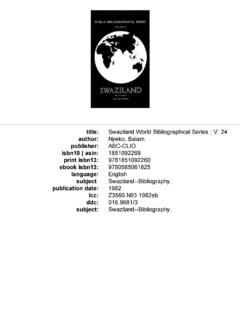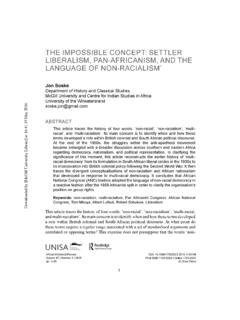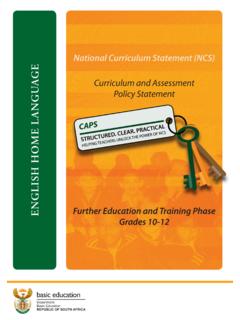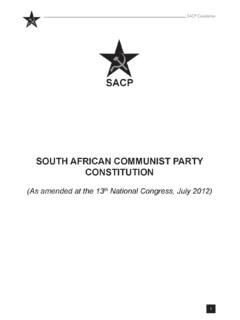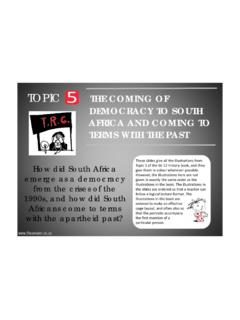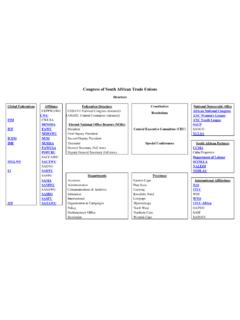Transcription of ForewArd - South African History Online
1 Historical Anniversariesam pleased to bring to you the 2012 Commemoration of Significant Historical Anniversaries booklet that chronicles our historical anniversaries. Perhaps, it is apposite to first make the point as to the importance of History in contemporary South Africa. Among one of the great leaders in our continent is Sir Seretse Kgama, the first President of Botswana who agitated for codification and reverence of a nation s past. He is often quoted to have said a nation without a past is a lost nation and a people without a past is a people without a soul . That is, to have a past, to know about that past and celebrate it completes us in some way as humans. Celebrating and commemorating our past is one way of building collective memory and consciousness and thus build social cohesion.
2 The report of the Working Group on Values in Education entitled Values, Education and Democracy emphasised the immense value of History teaching and the nurturing of historical consciousness, This report laid the foundation on which was to be inaugurated the South African History Project which aimed to promote and enhance the quality and status of the learning and teaching of History in our schools. Following on these earlier initiatives, we have compiled the 2012 booklet on historical anniversaries. Celebrating people ForewArdIand events of historical significance in our journey to freedom and democracy in this country is an important platform to build a common identity and chart the way forward to a cohesive society. Through the commemoration of key historical events that contributed to shaping our democracy, the Department of Basic Education aims to create the space to reflect, appreciate and learn from our challenges and achievements of the past.
3 This booklet therefore, is intended to assist schools to utilize effectively the opportunity created by public holidays and national events. The booklet aims to inculcate in young people appreciation for the History and heritage of our country while fostering respect for constitutional values, human rights, diversity and symbols of our nation. The activities in the booklet provide assistance to schools to organise and participate in commemorative anniversaries by providing insight into their historical significance and providing recommendations for activities. The activities proposed are aimed to foster dialogue and to give real expression to Unity in Diversity. Provinces are therefore encouraged to use opportunities provided and use national days to engage learners, teachers and School Governing Body members in meaningful activities to celebrate these days.
4 Schools are encouraged to include these days in their work plan for the year. However, the commemoration need not be limited to these days only. Schools could also draw on the community and other organisations to enrich their programmes. Key people responsible for the activities could also include local government, provincial government and Members of House of Traditional Leaders. This booklet captures those defining moments in our nation s History , as well as the players and issues at play. Unlike other learning resources, this booklet is plainly written and is meant to actively engage the reader. It therefore has relevant activities for the classroom, some of which can be done in a group work situation while some require solo effort. In places, the educator may have to organise visual representations as part of the lesson plan.
5 I hope you will find this booklet intellectually stimulating and that you will help us in your own way in reimagining our past so that we can continue to learn valuable lessons from that : Basic Education 21contentsIntroduction 42012 Historic Anniversaries 5 Anc Presidents 7 Human rights day 21 March 13 Freedom day 27 April 18workers day 1 May 22 Youth day 16 June 25 Mandela day 18 July 28women s day 9 August 32 Heritage day 24 september 36day of reconciliation 16 december 40 Glossary and references 44 Nelson Mandela is inaugurated as South Africa s president, Pretoria, 1994. Photograph by Guy Stubbs, supplied by Africa Media Online . 2 the 100 Year struggle for Freedom This booklet comes at a significant moment in South Africa s journey towards creating a unified society.
6 The ruling party, the African National Congress, is celebrating its 100th anniversary in 2012. Many of the public holidays that are described in this booklet originate in the freedom struggle, a struggle in which the ANC played a significant role. The section of this booklet titled 2012 Historic Anniversaries provides a list of other anniversaries in 2012, which are not celebrated as public holidays, but are significant milestones in our History . ince the beginning of our democracy in 1994, South Africa has been faced with the challenge of bringing together previously warring sectors of our society to develop one nation with a common future. Transformation is tough. It demands changing unjust, racist, Apartheid values and practices to values and practices characterized by non-discrimination.
7 One of the biggest transformation challenges faced by the new democratically elected government was to reflect on the different histories and heritages (some of which were in direct conflict with one another) and find ways to accommodate all of them in our new society. After much thought and meetings between government and civil society, a consensus was reached that concluded with the passing of the Public Holidays Act in 1994. All of the public holidays included in the Act were officially celebrated for the first time in 1995. Celebrating people and events of historical significance on our journey to freedom and democracy is important if we want to build a common identity and a cohesive society. This booklet samples some of these key historical events and creates the space for learners and teachers to reflect on, appreciate and learn from our achievements of the past.
8 Each section in this booklet looks at the History behind each of the public holidays and why we commemorate them. The key days covered in the booklet are: Human Rights Day, Freedom Day, Workers Day, Youth Day, Mandela Day, Women s Day, Heritage Day and the Day of Reconciliation. It is important to note that while Mandela Day is not a public holiday, it is an important day to mark. On10 November 2009 a unanimous resolution was adopted by the United Nations (UN) marking 18 July as International Nelson Mandela Day . sIntroductIonThe purpose is of this booklet is to; Impart knowledge on the socio-historiography of the days themselves. To suggest practical activities that the educator can introduce into the classroom to assist learners in celebrating and/or commemorating the given event. This booklet gives effect and substance to the DBE s commemorative calendar and it should be read in reference to the campaign on rights and responsibilities, the youth citizenship action programme, and the Nkosi Albert Luthuli Oral History Programme that aims to highlight and explore local histories and heritage that have received little recognition in the past.
9 Ruth First was assassinated 0 years ago while in exile in Mozambique. Source: National Library of South Africa, Cape Town Anniversaries commemorating thehistory of South AfricaThis is a selection of some historical anniversaries that our nation will remember during 2012. We call them historical anniversaries because the number of years ago that these events took place are significant to 2012 the event took place 220 years ago, 100 years ago or 25 years ago. You may want to do some research on some of these events at your school. It is important to note that writing History is a complex process. History is not just about the past .The past is everything that has ever happened. It is impossible for historians to write down everything. Historians select events and interpret evidence from the past in order to write means that all History is contested and disputed.
10 It is important to understand that History does not simply exist; historians construct History . Each historian selects and interprets evidence that has survived from the past in the light of the present as well as his or her own values, attitudes and ideology. There is not just one History , but many histories. So, this selection of anniversaries has been selected by the people who wrote this a more comprehensive listing of events visit SAHO s this day in History Online archive. 1632: Autshumato (Harry), a Khoi chief asked sailors passing by the Cape to ferry him and twenty of his followers to Robben Island where they lived on and off for a period of eight : The end of the Fourth Frontier War between the Xhosa and British. (The British colonised the Cape at the beginning of the nineteenth century). The British forced the Xhosa back across the Great Fish River and set up forts along this : The South African War between the Boers (in the mineral-rich Transvaal and Orange Free State Republics) and the British ended.

